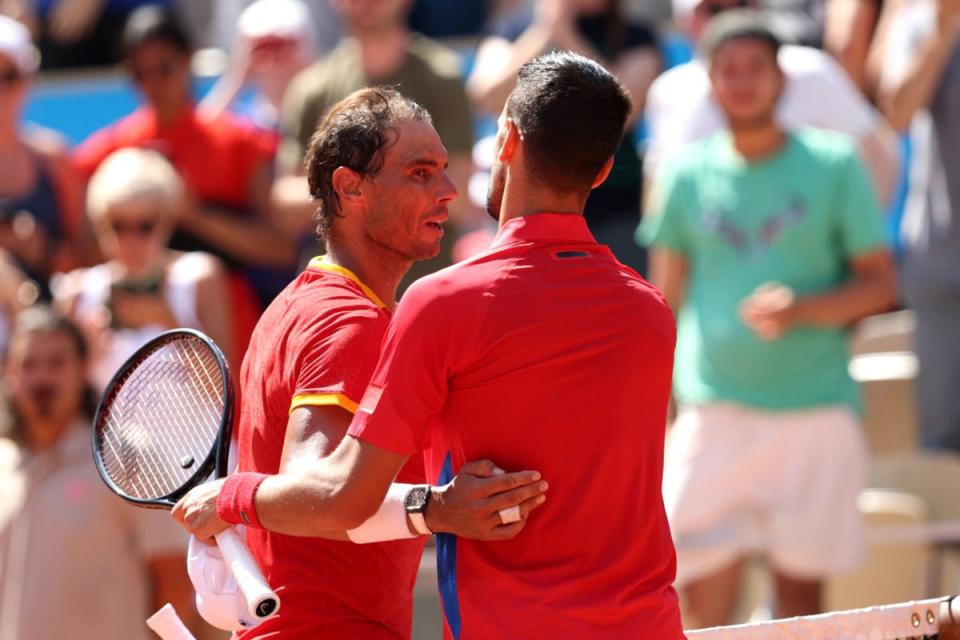As Rafael Nadal emerged into the bright sunlight and the baking Paris heat, the Spaniard sensed an unexpected opportunity to claim one of the greatest victories of his career. By a quirk of fate, the 38-year-old was handed the chance to face his great rival Novak Djokovic for a final time, on his fortress of Court Philippe-Chatrier and the scene of his 14 French Open titles. For the past two years, sidelined by injuries and frustrated by his body, Nadal had waited for such a moment, to face a fellow legend of his sport and relive his glorious past with a spirited final act.
Instead, as the sweat poured down his face, the King of Clay’s dream of a stirring final singles title at Roland Garros was destroyed by Djokovic, who kept his own ambitions of claiming an elusive Olympics gold alive with a 6-1 6-4 win. For Nadal, the price of being granted such a opportunity was the reality that victory was unlikely and a second-round exit entirely possible, even expected. While he showed typical fighting spirit in with his rallying fightback in the second set, Djokovic ultimately displayed his superiority in winning 10 of the first 11 games of this Olympics blockbuster and subduing his rival’s late charge.
The “last dance” between Nadal and Djokovic was initially a ruthless procession and leaves a conclusive final mark to their record rivalry. After a 60th encounter, the final score when the dust eventually settles will likely read 31 wins to Djokovic and 29 to Nadal. In their 11th meeting in Paris, Djokovic claimed just his third victory over Nadal on the Roland Garros clay, and one that may spell a sad end for the great Spaniard here in the singles format after he had given everything in his comeback to fuel one last run. His hopes now rest alongside Carlos Alcaraz in the men’s doubles.

Rarely in the sport’s history had a second-round match produced such a blockbuster affair, with 46 grand slam titles between them. Tennis can sometimes sit a little awkwardly within the great show of the Olympics, where other sports such as athletics, swimming and gymnastics take a deserved turn to sit in the limelight. But there was no doubting the magnitude of what this Olympics meant to two legends of the sport, as well as a final chance to meet in the heat of battle.
Nadal had barely played since their last encounter, a late-night duel in the quarter-finals of the 2022 French Open, in what was the Spaniard’s last title. While the 38-year-old has been disrupted by injuries and the inevitable reality of his body finally struggling to match his intense desire to compete, Djokovic, at 37, has managed to consistently challenge for and win the biggest titles in the game.
Last month, Djokovic reached the Wimbledon final just weeks after undergoing knee surgery – after tearing his meniscus on this court almost two months ago – and although his defeat to Carlos Alcaraz was a humbling one, the Serbian immediately switched his focus to a renewed bid for the Olympic title, the only major competition Djokovic has yet to win. Curiously, for a player who will likely finish his career having obliterated grand slam records, a single bronze medal at Beijing 2008 is all Djokovic has to show for his previous four appearances at the Games.


Despite Nadal’s record on Court Philippe-Chatrier, where he had won eight of his 10 matches against Djokovic, the Spaniard admitted he was in “a different situation”, his game “unpredictable”. And in the opening stages, it showed. While Nadal could still find flashes, getting around the ball to open up his forehand to send his opponent on the run with wicked angles, it was Djokovic who remained consistent and in control of the rallies. Djokovic turned to the drop shot, pulling Nadal from the baseline and out of position, and the break came as Nadal clipped the net-cord with his forehand, the ball landing out.
Djokovic then claimed the second break, absorbing Nadal’s forehand from the baseline and returning it with power and precision when he had the chance. Nadal framing his forehand on break point further subdued the crowd’s early excitement, as Djokovic launched a stinging backhand winner to win his fifth game in a row. While Nadal could eventually get onto the board, saving himself from the possible embarrassment of a bagel set, Djokovic immediately wrapped up the set as he impressively returned to the drop shot.
The break between sets offered Nadal the chance to reset, yet his forehand remained widely inconsistent, lacking the power and spin that for almost 20 years made him close to unbeatable on the Parisian clay. Djokovic roared as he again jumped into a 4-0 lead as Nadal slumped. And yet, just as it appeared there would be no let-off in the Serbian’s destruction, Nadal threatened an unlikely comeback; Djokovic conceding a break with a double fault that was roared enthusiastically by the crowd. Emboldened by new belief, Nadal attacked Djokovic with a forehand winner, then, in the point of the match, managed to scoop up a Djokovic smash that was directed into his feet to fire the passing winner, claiming the second consecutive break.
Back level at 4-4, Court Philippe-Chatrier shook, and did so again as Nadal saved three break points. And yet, Djokovic remained sharper in the biggest moments, recovering to break back at the fourth attempt before serving out victory with an ace. It is what Djokovic does, he silences the crowd, he finds his level when it counts. Nadal, though, used to dominate Roland Garros. At the end, as he waved farewell, those days now look to be finally over.
EMEA Tribune is not involved in this news article, it is taken from our partners and or from the News Agencies. Copyright and Credit go to the News Agencies, email news@emeatribune.com Follow our WhatsApp verified Channel





